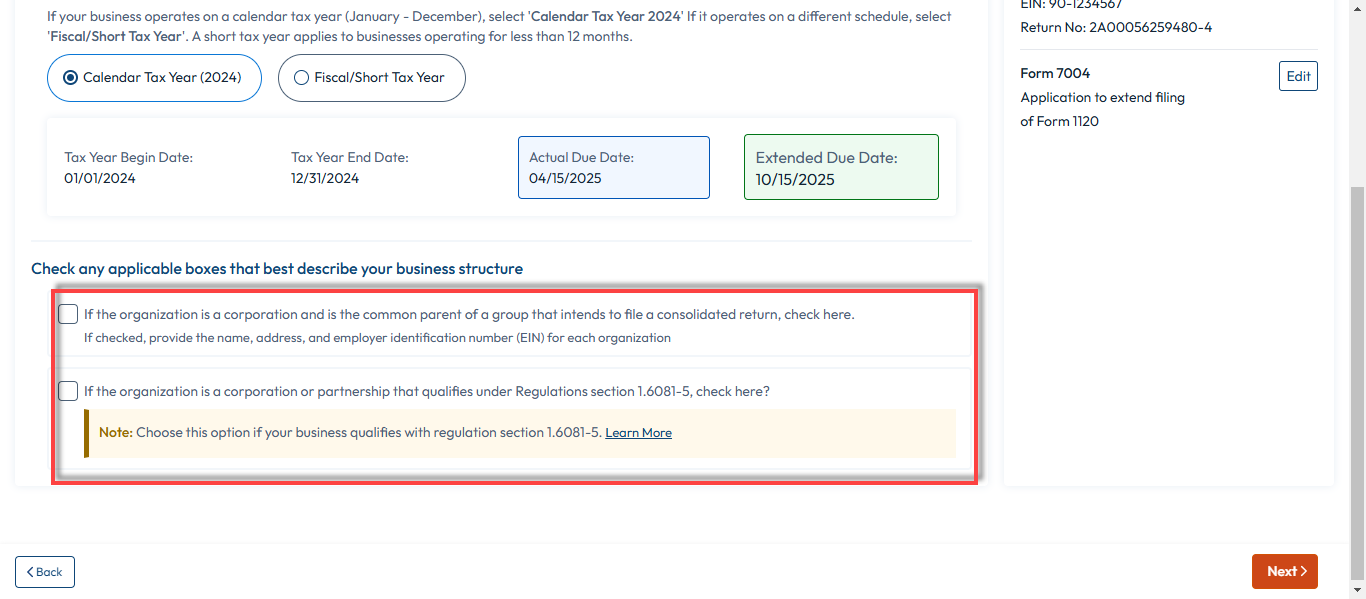How to file a tax extension for an S Corp tax return?
If an S-Corporation cannot file its 1120-S form on time, it can file a tax extension using Form 7004, which grants an automatic 6-month extension, moving the due date to October 15.
Steps to e-file an extension for an S-Corp tax form:
With ExpressExtension, filing an S-Corp tax extension is simple. Follow the minimal steps to e-file an extension form for S-Corp:
Step 1: Sign in to your account and click the "Create Business Tax Extension (Form 7004)" button on the dashboard.

Step 2: Select your preferred method to enter the details for filing an extension. You have the following options to import your details:
-
Manual Entry - Choose this option if you want to complete the form details by manually entering the information in the respective fields.
-
Bulk Import- This is recommended when filing a high volume of extension forms. We offer a wide range of bulk import options to choose from. To see how to file multiple 7004 forms using bulk upload, click here.
Step 3: Enter the business information in the respective fields, which should exactly match the IRS records. Verify that all the required information is correct and click the 'Next' option.

Step 4: Select the business tax return as '1120-S U.S. Income Tax Return for an S-Corporation' from the dropdown menu and click the 'Next' option.

Step 5: On this page, you must fill out the required information regarding the tax year, the type of return you need to file, and the structure of your business.
- Select the tax year: If your business operates on a calendar tax year (January - December), select 'Calendar Tax Year 2024'.

If it operates on a different schedule, select 'Fiscal/Short Tax Year.' and enter the tax year starting date and ending date. Our system will calculate the due date and the extended due date based on your tax year. A short tax year applies to businesses operating for less than 12 months.

- Business structure: Check the applicable boxes that best describe your business structure.

Once you've filled out the necessary information, verify it and click the 'Next' option.
Step 6: Enter the applicable tentative tax and payment details. If you owe any taxes to the IRS for the current tax year, enter the total tax amount, payments, and credits. You can choose the IRS payment method to complete the payment for your tax dues. To learn more about the IRS payment options, click here.
Note: Filing an extension ONLY extends the time to file your return; it does not extend the time to pay any taxes due. To avoid late payment penalties and interest, you must estimate the tax due and pay it when filing the extension.

Step 7: On the summary page, you can review the details you've entered and edit the information if needed. You can also download the draft extension form as a PDF. Once you verify the information, click the 'Proceed to Audit' button for the audit check.

Step 8: All your in-progress returns are listed here. If you want to file them in bulk, select the returns appropriately and click "Continue to E-file."

Step 9: Our system has audited your extension form based on the IRS business rules. If there are any errors, you can fix them and proceed to transmit.

Step 10: Proceed to payment and transmit the form. After transmission, track the status of your return in the dashboard.
Need more help?
Get in touch with our dedicated support team Contact Us
